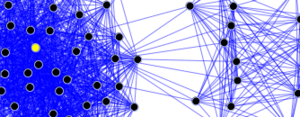 |
| Knowledge-planet (Photo credit: Wikipedia) |
One such presentation was given by Jocelyn Cranefield. Jocelyn started by giving a bit of context around the research she is doing. She started by looking at the importance of knowledge as a driver of educational change. The research context was the NZ School sector in 2006 and emphasised the importance of embedding the knowledge of "what works". What Jocelyn is looking at is teaching communities and the transfer of professional knowledge (knowledge that you need for your profession and you use it to do what you do. Such knowledge is likely to be very personal to you, and tied up with your beliefs).
One of the issues of the nature of knowledge when it comes to PD, is that it can get quite entangled. The intertertwined structure gains stetegy and rigidity over time. The research question was "How do online communities of practice facilitate the transfer and embedding of professional knowledge?". In traditional Communities of Practice (CoPs), knowledge is transferred via situated learning, but there is little understanding of how online envrironments support knowledge transfer.
 Image via Wikipedia
Image via WikipediaJocelyn conducted an interpretative study using qualitative data, which included purposive selection plus emergence, 45 interviews (including teachers, lead teachers, and principals), as well as forums, blogs, and IM that gave snapshots across time. She wanted to find out what happened offline as well as online, the relationship between the spaces, and how knowledge crosses over.
There was a great analogy in the presentation where researching interventions can be a little bit like putting an egg into a cake and then trying to work out what the effect of adding the egg has had. So, Jocelyn looked at both a top down view, as well as a bottom up view and then looked for emerging themes.
Some of the findings include: it came across very strongly that normative persuasive forces were at work. There was also a combination of focusing, persuading, aligning, adapting, and owning. There were, for example, in the different spaces, different cultures of practice. The connector-leaders used a range of brokering practices including filtering and focussing, reinforcing and contextualising and helping others. There was also a combination of different mechanisms, roles and technologies promoted in this process.
The knowledge embedding cycle includes six stages of organisational change with specific activities and issues at each stage - and the online CoPs played a different role at each stage.The six stages Jocelyn identified are:
- Coming on board
- Setting out
- Staying on course
- Anchoring
- Settling
- Plotting the course






1 comment:
Great post, guess we have to consider where and other staff at our schools are on the list of 6! It is certainly easy to get tangled in the mass of ideas and innovations and to get perplexed about where to even start for many teachers.
Post a Comment